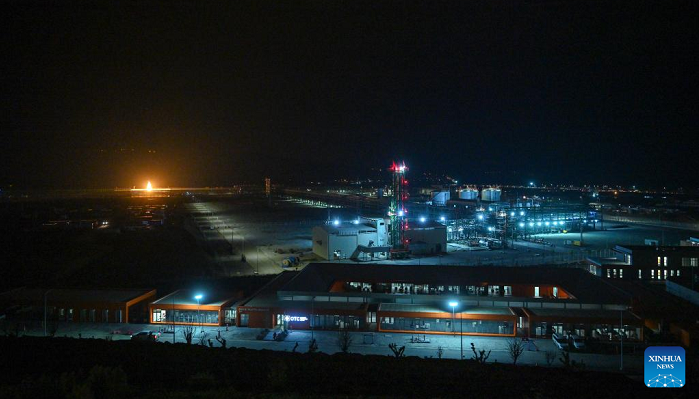
Türkiye: Türkiye on Thursday started the delivery of natural gas from its Black Sea field, as part of its flagship project aiming at reducing the country's dependence on energy imports.
The gas, shipped from a depth of 2,200 meters at the offshore Sakarya field via a 170-kilometer-long subsea pipeline and through various compression plants, was delivered to the newly constructed Filyos land facility located in the northern Zonguldak province.
Attending a commissioning ceremony of Black Sea natural gas in Zonguldak, President Recep Tayyip Erdogan said Türkiye is "taking a historic step toward energy independence."
"With great efforts and stride, the natural gas discovered just three years ago has been put into use," Erdogan said, adding that the field will meet approximately 30 percent of Türkiye's gas needs upon full capacity.
The Turkish leader announced that the country will provide free natural gas for household consumption up to 25 cubic meters monthly for one year.
His announcement came less than a month before the general elections on May 14, when he will seek a third term in office.
The Sakarya field will initially produce 10 million cubic meters of natural gas per day, with an expected rise to 40 million cubic meters by around 2028 at the second stage, the Turkish presidency said in a statement on Thursday.
Oguzhan Akyener, president of Türkiye's Energy Strategy and Political Research Center, told the semi-official Anadolu Agency that the first Black Sea gas will contribute 35 billion liras (1.8 billion U.S. dollars) to the economy.
Türkiye's offshore gas reserves in the Black Sea are estimated at 710 billion cubic meters, which is enough to meet its domestic gas demand for 35 years, the NTV quoted Turkish Energy Minister Fatih Donmez as saying.
Currently, Türkiye imports most of its gas from Russia and Azerbaijan. The Sakarya field is part of Türkiye's plan to reduce its dependence on energy imports and turn Filyos into a significant energy hub.
Türkiye, with its geographical advantage, has already served as a transit route for major gas pipelines. The presence of infrastructures such as the TurkStream in the Black Sea makes it easier for the country to re-export a mix of imported gas to European countries.
Turkish President Recep Tayyip Erdogan and other officials attend a commissioning ceremony of Black Sea natural gas in Filyos, Zonguldak province, Türkiye, on April 20, 2023. Türkiye on Thursday started the delivery of natural gas from its Black Sea field, as part of its flagship project aiming at reducing the country's dependence on energy imports. (Photo by Mustafa Kaya/Xinhua)
Turkish President Recep Tayyip Erdogan (C, Rear) attends a commissioning ceremony of Black Sea natural gas in Filyos, Zonguldak province, Türkiye, on April 20, 2023. Türkiye on Thursday started the delivery of natural gas from its Black Sea field, as part of its flagship project aiming at reducing the country's dependence on energy imports. (Photo by Mustafa Kaya/Xinhua)
Photo taken on April 20, 2023 shows a gas flame at Filyos land facility in Filyos, Zonguldak province, Türkiye. Türkiye on Thursday started the delivery of natural gas from its Black Sea field, as part of its flagship project aiming at reducing the country's dependence on energy imports. (Photo by Mustafa Kaya/Xinhua)